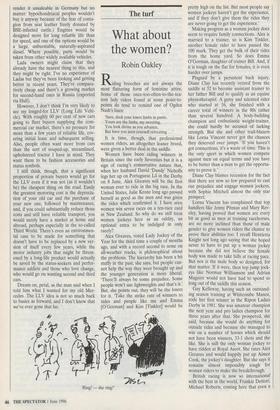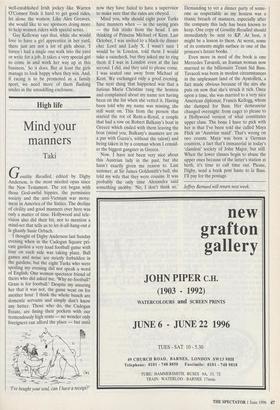The turf
What about the women?
Robin Oakley
Riding breeches are not always the most flattering form of feminine attire. Some of those once-too-often-to-the-tea- tent lady riders found at some point-to- points do tend to remind one of Ogden Nash's lines:
'Sure, deck your lower limbs in pants, Yours are the limbs, my sweeting, You look divine as you advance, But have you seen yourself retreating ...'
It is time, though, that professional women riders, an altogether leaner breed, were given a better deal in the saddle.
Women have been riding winners in Britain since the early Seventies but it is a sign of racing's conservative nature that, when her husband David 'Dandy' Nicholls legs her up on Portuguese Lil in the Derby on 8 June, Alex Greaves will be the first woman ever to ride in the big race. In the United States, Julie Krone long ago proved herself as good as the men and was given the rides which confirmed it. I have seen women win seven races on a ten-race card in New Zealand. So why do we still treat women jockeys here as an oddity, an optional extra to be indulged in only rarely? Alex Greaves, voted Lady Jockey of the Year for the third time a couple of months ago, and with a record second to none on all-weather tracks, is philosophical about the problems. The hierarchy has been a bit stuffy in the past, she says, but people can- not help the way they were brought up and the younger generation is more liberal. 'There'll always be some prejudice. Some people won't use lightweights and that's it.' But, she points out, they will be the losers for it. 'Take the strike rate of winners to rides and people like me and Emma [O'Gorman] and Kim [Tinkler] would be 'Ring! — the ring!' pretty high on the list. But most people say women jockeys haven't got the experience, and if they don't give them the rides they are never going to get the experience.'
Making progress as a woman jockey does seem to require family connections. Alex is married to a trainer, so is Kim Tinkler, another female rider to have passed the 100 mark. They get the bulk of their rides from the home yard. So does Emma O'Gorman, daughter of trainer Bill. And, if it is tough on the flat for females, it is even harder over jumps.
Plagued by a persistent back injury, Diane Clay has recently retired from the saddle at 32 to become assistant trainer to her father Bill and to qualify as an equine physiotherapist. A gutsy and talented rider who started at 16, she finished with a career total of winners in the 80s rather than several hundred. A body-building champion and enthusiastic weight-trainer, she could hardly be accused of lacking strength. But she and other trail-blazers like Lorna Vincent never got the chances they deserved over jumps. 'If you haven't got connections, it's a waste of time. This is the only sport in which women compete against men on equal terms and you have to be better than a man to get the opportu- nity to prove it.'
Diane Clay blames recession for the fact that there are now so few prepared to cast out prejudice and engage women jockeys, with Sophie Mitchell almost the only star prospect.
Lorna Vincent has complained that top handlers like Jenny Pitman and Mary Rev- eley, having proved that women are every bit as good as men at training racehorses, are no more inclined than those of male gender to give women riders the chance to prove their abilities too. I recall Henrietta Knight not long ago saying that she hoped never to have to put up a woman jockey because she did not believe the female body was made to take falls at racing pace. But nor is the male body so designed, for that matter. If it were, then top jump jock- eys like Norman Williamson and Adrian Maguire would not have had to spend so long out of the saddle this season.
Gay Kelleway, having such an outstand- ing season training at Whitcombe Manor, rode her first winner in the Ripon Ladies Derby in 1981. She was amateur champion the next year and pro ladies champion for three years after that. She prospered, she said, because she would do anything for outside rides and because she managed to win on a number of horses which should not have been winners, 33-1 shots and the like. She is still the only woman jockey to have ridden at Royal Ascot. She rates Alex Greaves and would happily put up Aimee Cook, the jockey's daughter. But she says it remains almost impossibly tough for women riders to make the breakthrough.
British racing is now so international with the best in the world, Frankie Dettori, Michael Roberts, coming here that even a well-established Irish jockey like Warren O'Connor finds it hard to get good rides, let alone the women. Like Alex Greaves, she would like to see sponsors doing more to help women riders with special series.
Gay Kelleway says that, while she would love to have a girl apprentice in her yard, there just are not a lot of girls about. 'I haven't had a single one walk into the yard or write for a job. It takes a very special girl to come in and work her way up in this business.' So it does. But at least the girls manage to look happy when they win. And, if racing is to be promoted as a family sport, we need more of them flashing smiles in the unsaddling enclosure.



























































 Previous page
Previous page